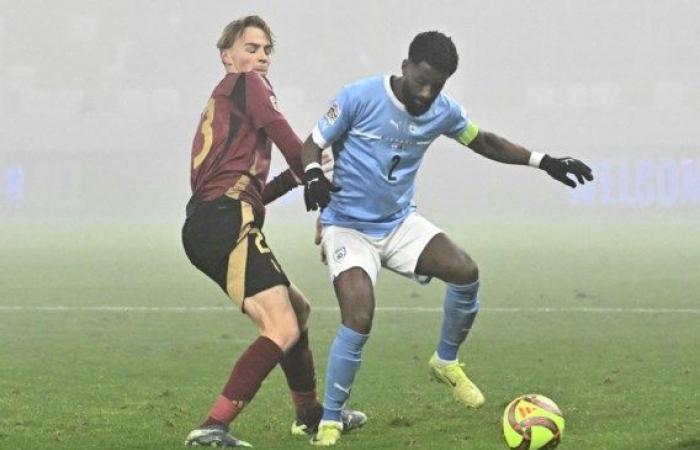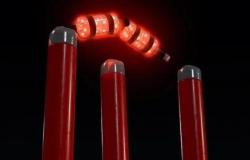“It wasn’t a good campaign in terms of results, but we did launch young players.” Even before the kick-off of Israel-Belgium, national coach Domenico Tedesco had completed his evaluation of the Nations League. A day earlier, the German had let slip that he had already warned in advance that he would test young talent. As if he had thereby bought all-risk insurance – and the result would no longer count.
Tedesco argues that the football association itself had not clearly communicated what the expectations were for this Nations League campaign. A week ago, the new federation CEO Peter Willems showed understanding for the situation of contemporary international football, where hardly any friendly matches are played. “I understand that the national coach wants to see new players because it can pay off later.” But Willems also said that the intention was always to win. With one win in six matches in the Nations League, it can hardly be said that that criterion has been met.
The last match on Sunday against Israel symbolized the harsh winter in which the Red Devils found themselves. At temperatures just below freezing point, in the empty and foggy stadium of the Hungarian second division club Honved Budapest, the corner flags were barely visible. After an hour, the fourth referee replaced the ball with a fluorescent one – the visibility was that bad. 675 spectators, including 160 courageous supporters from Belgium, braved the cold.
In addition to the absences of Kevin De Bruyne, Jeremy Doku, Youri Tielemans and Charles De Ketelaere, five more players had dropped out for the trip to Hungary on Saturday: Romelu Lukaku, Arthur Theate, Maxim De Cuyper, Amadou Onana and Romeo Lavia. “They all have a medical reason,” Domenico Tedesco hastened to say. Yet sudden waves of injuries for unenviable matches are mainly reminiscent of an international trend, in which top players make agreements with national coaches to occasionally skip a mandatory number. One of those negotiations led to a conflict between the national coach and goalkeeper Thibaut Courtois a year and a half ago.
Either all those players are now actually injured, or Tedesco has become less principled after a year. Belgium therefore started with an emergency team in a match that still had stakes – losing by more than two goals could have led to a slumming last place in group 2 of the A series in the Nations League.
Israeli opportunities
And there were Israeli goal chances. Belgium started encouragingly, with three good shooting opportunities in the opening quarter, but then started to play at the opponent’s pace and also gave away space. Israel hit the target twice before halftime. After Wout Faes slipped, a good save from Koen Casteels was needed to keep Israeli Dor Peretz from scoring.
After the defeat against Israel, the question is louder than ever: can Tedesco still stay on as national coach? — © PIXSELL
After 35 minutes of play, the Belgians were injured: Leandro Trossard, the man from whom the ideas were supposed to come, had to abandon the fight. The Belgian midfield was formed by Orel Mangala, Arthur Vermeeren and Arne Engels. Trossard was on the left flank, ahead of Timothy Castagne. On the right flank, Dodi Lukebakio tried to reach lone striker Loïs Openda.
Trossard’s replacement, Johan Bakayoko, was good for one of the few Belgian chances in the second half. Israeli goalkeeper Daniel Peretz tapped his effort away from under the crossbar. Openda hit the side netting – scoring has suddenly become a major problem for Belgium.
Smets made a horrible mistake
But the biggest drama took place on the other side on Sunday. Matte Smets, who played his first minutes with the Red Devils as a substitute, played the ball centrally in front of goal, allowing Israeli substitute Yarden Shua to score the 1–0. Israel had not yet had a chance in the second half, but it suddenly fell into their lap.
The disaster scenario, in which Belgium would lose by three goals and be relegated, was never realistic, but in terms of symbolism a defeat can count as the final chord of the Nations League. For the first time since September 2010, Belgium loses three games in a row. For the first time since 2009, it loses more than six games in a calendar year. The credit that Domenico Tedesco built up in his first year seems to have been lost in his second year. First with a disappointing European Championship, then with an even more disappointing Nations League.
The weight of the most recent international country competition may be minor, but it may be important enough to say goodbye to a national coach early. The question is not whether Vincent Mannaert will intervene, but when he will: before or after the jump-offs for retention in the A series of the Nations League that Belgium will have to play in March.
ISRAEL-BELGIUM1–0Goals: 86′ Shua 1–0






